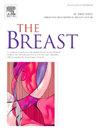在现实世界中,转移性三阴性乳腺癌患者化疗的基因组特征和分子预测生物标志物。
IF 5.7
2区 医学
Q1 OBSTETRICS & GYNECOLOGY
引用次数: 0
摘要
目的:我们旨在描述在现实环境中接受化疗的转移性三阴性乳腺癌(mTNBC)患者具有潜在预后或预测意义的基因组改变。患者和方法:使用FoundationOne®CDx对112例连续mTNBC患者的原发肿瘤组织进行了新一代测序。基因组改变被细分为典型的致癌途径,并以其参与同源重组缺陷(HRD)而闻名。在接受不同化疗药物治疗的患者中,改变的基因和途径与总生存期(OS)相关,并评估了它们与真实世界无进展生存期(rwPFS)的关系。对化疗反应异常和进展迅速的患者进行比较。结果:在因肿瘤组织或临床资料不足而排除后,对97例患者的资料进行分析。最常见的改变基因是TP53(82%)、RAD21(25%)和PIK3CA(23%)。总的来说,26%的患者发生了导致HRD的改变。所分析的变化均与OS无关。在一线接受铂类化疗的患者中,导致HRD的变异与延长的rwPFS相关(风险比[HR], 0.31 [95% CI: 0.12-0.84])。与快速进展者相比,异常应答者更常表现出MYC和RAS/RTK通路的改变。结论:hrd相关基因肿瘤改变的患者似乎定义了对铂类化疗反应良好的亚组。对快速进展或对不同治疗策略有特殊反应的患者的肿瘤基因组景观的进一步研究可以提供对耐药机制的见解并确定预测性生物标志物。本文章由计算机程序翻译,如有差异,请以英文原文为准。
Genomic characterization and molecular predictive biomarkers for chemotherapy in patients with metastatic triple-negative breast cancer treated in a real-world setting
Purpose
We aimed to characterize genomic alterations with potential prognostic or predictive significance in patients with metastatic triple-negative breast cancer (mTNBC) treated with chemotherapy in a real-world setting.
Patients and methods
Next-generation sequencing with FoundationOne® CDx was conducted primarily on primary tumor tissue from 112 consecutive patients with mTNBC. Genomic alterations were subdivided into canonical oncogenic pathways and noted for their involvement in homologous recombination deficiency (HRD). Altered genes and pathways were correlated with overall survival (OS) and evaluated regarding their association with real-world progression-free survival (rwPFS) in patients treated with different chemotherapy agents. Occurrence of alterations were compared between patients with exceptional response and rapid progression to chemotherapy.
Results
After exclusion due to insufficient tumor tissue or clinical data, material from 97 patients was analyzed. The most frequently altered genes were TP53 (82 %), RAD21 (25 %) and PIK3CA (23 %). Altogether, 26 % of patients had an alteration leading to HRD. None of the analyzed alterations were associated with OS. Variants leading to HRD were associated with a prolonged rwPFS in patients treated with platinum-based chemotherapy in the first line setting (hazard ratio [HR], 0.31 [95 % CI: 0.12–0.84]). Exceptional responders more often exhibited alterations in the MYC and RAS/RTK pathways compared to rapid progressors.
Conclusions
Patients with tumor alterations in HRD-related genes seem to define subgroups that respond favorably to platinum-based chemotherapy. Further research into the genomic landscape of tumors from patients with rapid progression or exceptional response to different treatment strategies can provide insights into mechanisms of resistance and identify predictive biomarkers.
求助全文
通过发布文献求助,成功后即可免费获取论文全文。
去求助
来源期刊

Breast
医学-妇产科学
CiteScore
8.70
自引率
2.60%
发文量
165
审稿时长
59 days
期刊介绍:
The Breast is an international, multidisciplinary journal for researchers and clinicians, which focuses on translational and clinical research for the advancement of breast cancer prevention, diagnosis and treatment of all stages.
 求助内容:
求助内容: 应助结果提醒方式:
应助结果提醒方式:


